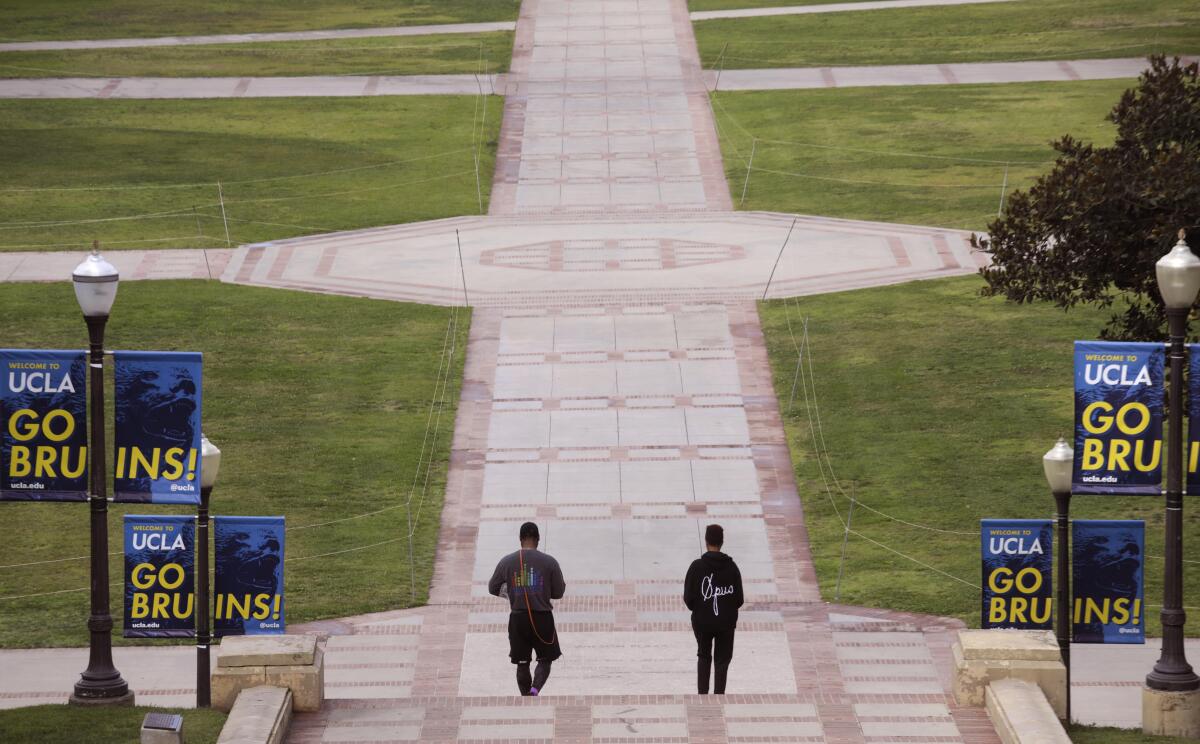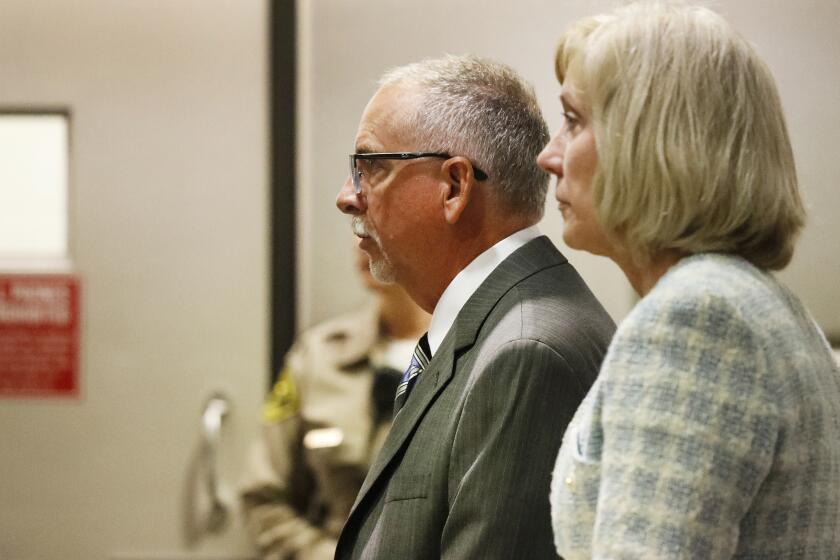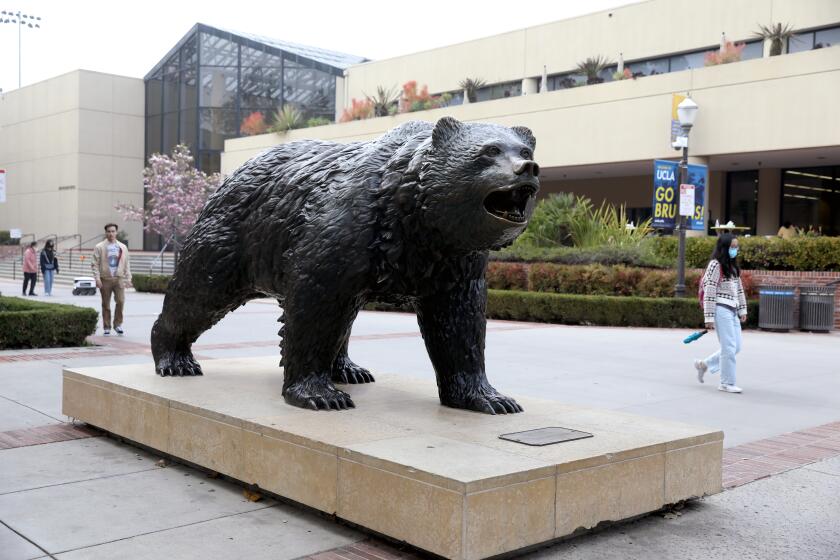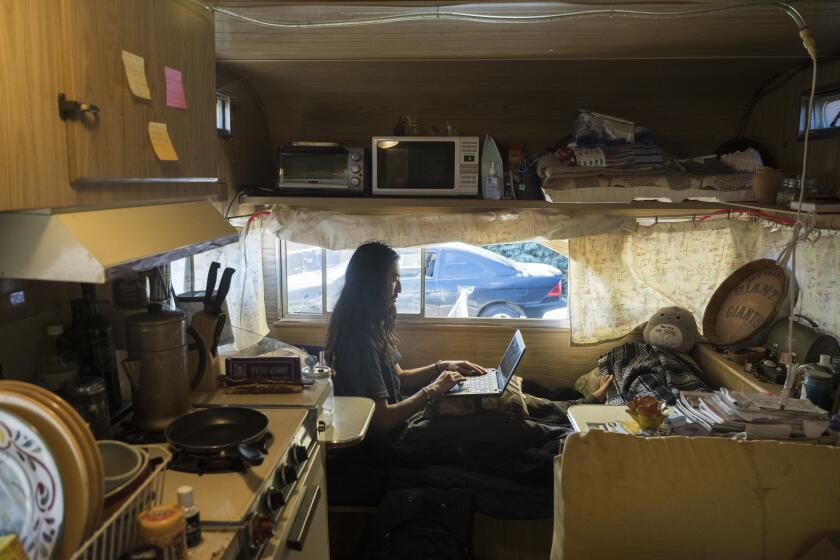Hazing ‘traditions’ and sexual assault plagued UCLA summer camp job, students say

- Share via
When UCLA students Samea Derrick and Lydia Dixon were hired as camp counselors at Bruin Woods, a Lake Arrowhead summer getaway for alumni, they were excited to land the coveted job with its networking opportunities.
But after less than one week at the camp, the two would head back down the mountain and return home, traumatized by intense hazing at the hands of other counselors, they said.
During those five days in June, Derrick, 19, and Dixon, 20, said they were sexually assaulted and hazed by returning student counselors, including physical and verbal abuse, sensory deprivation, forced nudity, and coercive drinking games.
Derrick and Dixon spoke with The Times and filed a lawsuit this week in Los Angeles County Superior Court against the University of California regents and other camp counselors, including two men accused of sexually assaulting them.
The lawsuit alleges the hazing activities, referred to by counselors as “traditions,” have taken place for decades at the camp, established in 1985 for UCLA alumni and their families. It references a 1999 news article by the Daily Bruin student newspaper, which mentions activities such as swimming in the lake naked and partying as prerequisites for becoming a counselor.
“The reason that we’re doing this is to expose the dangerous behavior at Bruin Woods and to hold the regents accountable for allowing the behavior to go unchecked for so long,” said Scott Carr, an attorney who filed the lawsuit Tuesday on the students’ behalf.
The suit alleges negligence, civil rights violations, hazing, gender violence, two cases of assault and battery, and intentional infliction of emotional distress. It seeks a jury trial, $50,000 in damages and compensation for legal fees and medical expenses.
The 65-year-old had been charged with 21 felony counts, but was found guilty of only five. He was found not guilty of seven other counts and the jury deadlocked on nine other sex-related charges.
Before arriving at the camp, Derrick and Dixon said they had heard rumors of heavy drinking, partying and sex. Incoming counselors were given a packing list that included a fake ID for under-21 students, condoms and birth control, the lawsuit said.
During the drive up the San Bernardino Mountains, Derrick, Dixon and other counselors were forced to drink and were challenged to keep from throwing up as the cars snaked through the winding roads, they said.
Staff and returning counselors welcomed the newcomers with open arms, referring to the group as a “family” and a “team that will be with you for life.” But “every single night, it would just become more and more intense, like they would cross more and more boundaries,” Derrick said.
Communication with the outside world was discouraged; counselors were chastised for calling friends and family, and phones were banned during most of the “traditions,” the students said.
Drinking was encouraged each night at parties hosted by returning counselors at camp facilities, according to the lawsuit.
During a party at the start of the week, Dixon lost consciousness after heavy drinking and, while asleep, was sexually assaulted by a male returning counselor, she said.
The next day, she said, her supervisors kicked out the counselor after she reported the incident to them, and she decided to carry on with hopes that things would improve.
On the third night, around 11 p.m., Dixon said she was too tired and wouldn’t join the evening’s party. However, a returning counselor assured her this was one of her “favorite traditions” and convinced her to attend. Newcomers were told to bring pillowcases and a shoelace.
The new counselors were forced to remove their shoes and place the pillowcases over their heads, and were marched into the woods where they were told to hold their arms up until they lost circulation, the lawsuit said. Then, they were brought to a room where other counselors yelled insults at them.
Dixon, who is a part of Greek life on campus, said she had never been hazed before and didn’t expect such “demeaning” treatment while working at a UCLA job.
“And so I was kind of confused, but I thought, you know, maybe that’s the worst of it,” she said.
But the next night, newcomers were “peer-pressured” into taking off their clothes and jumping on a slip-n-slide that led to the lake.
“I was scared,” Derrick said. “Like, I barely knew these people.”
Three UCLA professors allegedly solicited international postgraduate orthodontics students for unauthorized fees, court records drawing from an investigative report said. The professors are trying to keep the report hidden
On Wednesday evening of that week, the newcomers were invited to a party at a camp warehouse, where the returning counselors greeted them while standing completely naked and encouraged the newcomers to remove their clothes as well, Dixon said.
“When I walked in that room, I just felt like everyone was like just the same as the boy who had assaulted me,” Dixon said. “I was so mortified.”
Dixon and Derrick were among the newcomers who tried to leave the party early, they said, but they realized the doors were locked from the outside.
When returning counselors tried to convince them to stay, Dixon said she felt uncomfortable and referred to her assault. The counselors assured her that “if I just took off my clothes, I’d feel so much better and this is how they build trust.”
Both stayed at the party clothed. “I honestly still really wanted them to like me,” Dixon said.
After the party, naked counselors ran up and down the hallways of the two-story, co-ed house shared by counselors and were jumping into showers together. Dixon said she and other newcomers locked themselves inside a room where some were in tears and others were having panic attacks.
Later that night, Derrick lost consciousness and was also sexually assaulted by a male counselor while she slept, according to the lawsuit.
“When I woke up on Thursday morning, I was naked in my bed, and I just had like sheer panic ... because I didn’t know what had happened,” Derrick said.
She confronted a counselor whom she remembered spending time with during the party, and he admitted to the assault, she said. When reporting it to her supervisors, she said she was peppered with intense questioning.
Derrick immediately called her father, who picked her up Friday and returned to their Santa Clarita home.
Other new hires had also expressed a desire to leave early but decided to stay after speaking to returning counselors. Dixon worried the same would happen to her and decided to keep to herself until her parents arrived from their home in the Northern California city of Paradise for camp counselors’ traditional opening-week musical theater show.
“I remember thinking, even if they changed my mind, they won’t be able to change my mom’s mind,” Dixon said.
By the end of the week, after walking her parents through the events of the last several days, Dixon also left the mountain with her family.
As most University of California campuses start classes this month, the acute shortage of affordable housing is pushing many students into desperation, including living in trailers or working multiple jobs to cover high rents.
Soon after, Dixon reached out to Derrick. Both reported their experiences to the university’s Title IX office, then decided to look for an attorney.
A UCLA spokesperson said the university has zero tolerance for sexual harassment, sexual violence and hazing.
“When we learned of the alleged incidents earlier this year, they were referred to our Title IX Office and are being handled according to university policies and procedures,” the university said in a statement, declining to comment further to protect the privacy of those involved. “Our top priority is the well-being of our students, staff and families, and we have robust policies in place to review all claims of misconduct.”
UCLA had been a dream school for Dixon, a political science major who grew up in Northern California falling in love with the idea of living in Los Angeles and had heard glowing stories from her sister-in-law who attended the university. Derrick, who studies environmental science, was drawn to UCLA for its research opportunities and variety of clubs.
But since camp, Derrick and Dixon said their mental health has suffered, making their return to campus difficult.
Derrick took a gap quarter this fall after she had several panic attacks while seeing other camp counselors on campus. She was also prescribed medications for her mental health.
“I didn’t physically feel safe on campus anymore,” Derrick said.
Dixon said she was diagnosed with post-traumatic stress disorder over the summer and was prescribed medications. The next few months were filled with anxiety and depression, and she found it difficult to leave her house.
Although she returned to campus for classes this fall, Dixon said she still freezes up when she sees other camp counselors, whom she also shares some classes with.
“It’s just been really difficult to deal with, so I want to make sure that no one else has to,” Derrick said.
It is unclear how many supervisors at the camp and at UCLA were aware of the hazing, Carr said. He expects that will be revealed during discovery in the case.
Dixon said she spoke with other female counselors who shared experiences of assault, with some waking up to male counselors touching their genitals. During training, she said counselors shared that four separate Title IX cases were filed after the previous summer’s camp. She was told the “traditions” were more intense in previous years with even less consent, and had since been toned down.
“I’m sure there’s like so many people who were victims of this in the past, who weren’t able to speak out for whatever reason,” Dixon said.
Carr, who has represented survivors of sexual assault at school districts and churches, as well as hazing survivors from universities, said such behavior thrives in secrecy.
“They bring you in, talking about how they’re going to be your best friends, and they get you to trust them, and then once you trust them, they get you to protect their secrets,” Carr said. “And that’s exactly what happened here.”
More to Read
Sign up for Essential California
The most important California stories and recommendations in your inbox every morning.
You may occasionally receive promotional content from the Los Angeles Times.

















